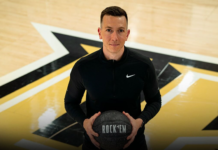Life always comes with unexpected difficulties but for many, these obstacles do not include having to abandon homes in fear, listen to bomb attacks while huddled in a crowded tent, or being thrust into an entirely new culture. For one Central Florida resident, however, these are the obstacles that he and his family have had to overcome over the past few years.
Mohammed Hamoud is a Syrian refugee who came to Florida with his family eight months ago after escaping their war-torn homeland in the beginning of 2013.
According to a recent data analysis from the United Nations High Commissioner for Refugees (UNHCR), the Syrian Civil War, which began in 2011, has been responsible for the displacement of over 4.8 million Syrian residents.
Before the war began, Hamoud, his wife, and three children who are now 24, 17, and 13, used to live on a 12 acre farm on the border of Syria. The farm was prosperous and Hamoud and his eldest son both worked as electricians.
As the war begins its fifth year of fighting, the humanitarian crisis has reached an all time high as neighboring countries are beginning to limit their acceptance of refugees. Those who are still waiting to attain asylum are being forced to live in refugee camps where living conditions are extremely harsh.
“It [the conditions in the refugee camps] was bad,” Hamoud recalls, pulling out his cell phone to show photos of the environment that his wife and children spent three years in. “The summer was always to hot. In the winter it would flood out.”
The photos that Hamoud displayed, depicted white UNHCR tents baking under a hot sun, as well as tents covered in snow, and other photos of tents in standing water; refugees knee deep in murky liquid.
“Even if we wanted to buy a house, refugees are not allowed to work,” Hamoud said, explaining another difficulty of living in these camps. No one could independently provide for their families, no matter how much education or experience they had.
Hamoud and his family were finally accepted to America in August of 2015, first spending time in Miami before eventually moving to Central Florida with the help of the Floridians Responding to Refugees Committee, a community organization whose main focus is to provide assistance to newly arrived refugees.
Mary Assaf, one of the coordinators for FRRC, explained that this program started with the sole intent of helping newly resettled refugees assimilate into the new culture.
“The goal is that as long as refugees continue to come into the country, we will continue to serve them,” Assaf said. “We started this program because there was no set refugee program and those who just arrived in Miami were not sure what to do.”
With the support of the local community, FRRC has the ability to give each approved family six months of support which includes paid rent and utilities, a stocked pantry, kitchen, groceries, and one car per family. Individuals within the family are also helped with finding a job.
With their help, Hamoud’s eldest son, Tammam, now works repairing air conditioners.
Hamoud is unable to do a lot of physical work due to a leg injury he acquired in Syria when a missile struck a building he was in, causing the infrastructure to fall on Hamoud’s leg. Because of that injury, there is now a metal bar in his leg to help him walk.
It has been six months since Hamoud and his family have settled into their home here in Central Florida and while the living conditions are significantly better than what they’ve had to endure, Hamoud explained that the struggle to adjust to their new life is not yet over.
“Things are getting better and better as time progresses,” Hamoud said. “The only one issue at this time is I haven’t been able to find work because of the language barrier.”
In an article by the American Sociological Association, sociology professor Theo Majka says that the greatest obstacle that refugees have to overcome once resettling is learning a new language. Since none of Hamoud’s family spoke English prior to seeking refuge in America, this struggle has become a reality and the most recent barrier that must be overcome.
Currently, Hamoud is taking English language classes at Seminole State College and once he is proficient, says he looks forward to possibly pursuing an academic education. Until that time, he and his family are dedicating their time to learning as much as they can about the world that they are now in and Hamoud is thankful to the kindness that people in America have shown him so far.
“It is safer, much safer here,” Hamoud said with a smile. “And thank you to America for accepting me and my family.”
(This interview was translated with the assistance of Daniel Diab, a FRRC volunteer.)






